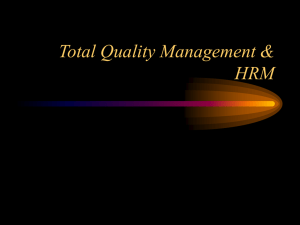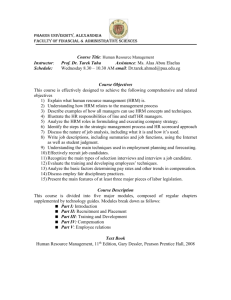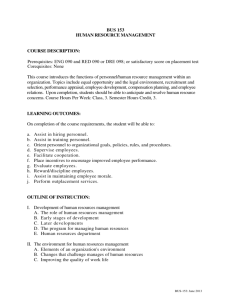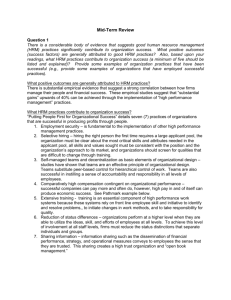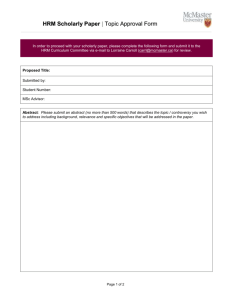course syllabus
advertisement
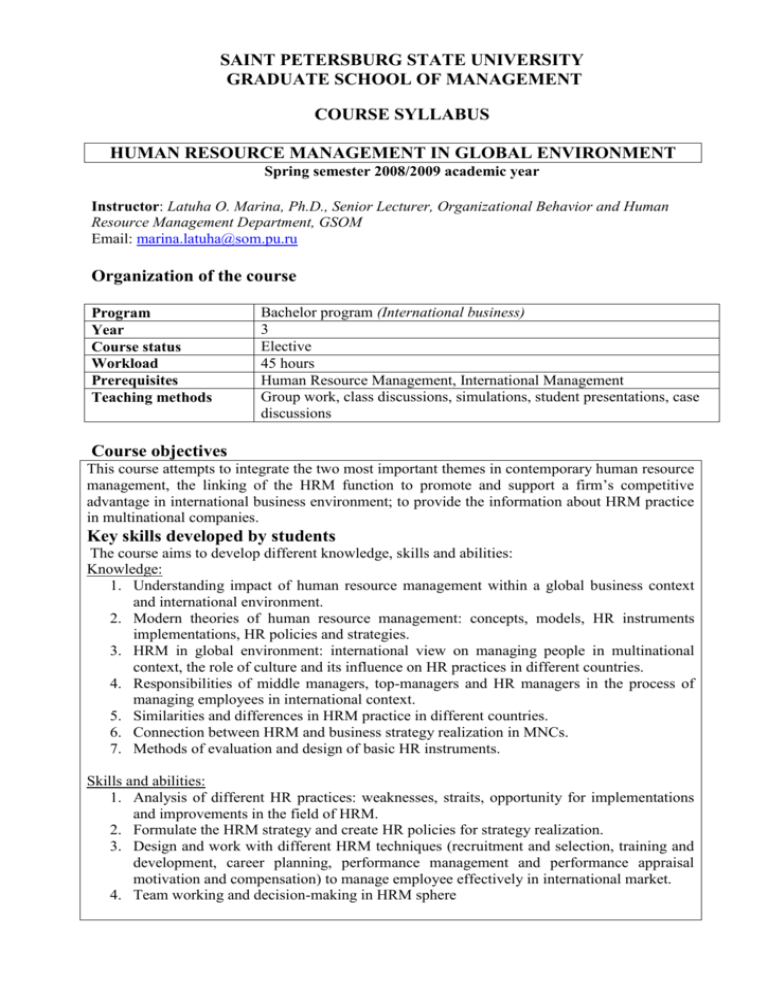
SAINT PETERSBURG STATE UNIVERSITY GRADUATE SCHOOL OF MANAGEMENT COURSE SYLLABUS HUMAN RESOURCE MANAGEMENT IN GLOBAL ENVIRONMENT Spring semester 2008/2009 academic year Instructor: Latuha O. Marina, Ph.D., Senior Lecturer, Organizational Behavior and Human Resource Management Department, GSOM Email: marina.latuha@som.pu.ru Organization of the course Program Year Course status Workload Prerequisites Teaching methods Bachelor program (International business) 3 Elective 45 hours Human Resource Management, International Management Group work, class discussions, simulations, student presentations, case discussions Course objectives This course attempts to integrate the two most important themes in contemporary human resource management, the linking of the HRM function to promote and support a firm’s competitive advantage in international business environment; to provide the information about HRM practice in multinational companies. Key skills developed by students The course aims to develop different knowledge, skills and abilities: Knowledge: 1. Understanding impact of human resource management within a global business context and international environment. 2. Modern theories of human resource management: concepts, models, HR instruments implementations, HR policies and strategies. 3. HRM in global environment: international view on managing people in multinational context, the role of culture and its influence on HR practices in different countries. 4. Responsibilities of middle managers, top-managers and HR managers in the process of managing employees in international context. 5. Similarities and differences in HRM practice in different countries. 6. Connection between HRM and business strategy realization in MNCs. 7. Methods of evaluation and design of basic HR instruments. Skills and abilities: 1. Analysis of different HR practices: weaknesses, straits, opportunity for implementations and improvements in the field of HRM. 2. Formulate the HRM strategy and create HR policies for strategy realization. 3. Design and work with different HRM techniques (recruitment and selection, training and development, career planning, performance management and performance appraisal motivation and compensation) to manage employee effectively in international market. 4. Team working and decision-making in HRM sphere Course content Topic 1. Introduction to HRM. Models of HRM: historical overview and main issues. Organizational strategy and HR strategy. The main factors in organizational success in global market. International business environment and its influence to HRM practice. Topic 2. The main parts of international HRM: functional blocks and instruments. Job analysis and planning. Recruitment. Selection. Training and development. Performance Appraisal. Motivation and compensation. Main definitions and international context. Topic 3. Approaches to international staffing. Recruitment and selection procedures in multinational corporations. Expatriates in selection process: requirements and methods for international assignments. Global competencies for managers and leaders. Topic 4. Differences in management education and training systems in different countries and multinational companies. Current trends in employee training and development. New forms of corporate education. Corporate universities as a main force of organizational development. Topic 5. Career. Factors affecting career. Different types of career development. Global career system. Topic 6. Global performance management and appraisal. Characteristics of performance management and appraisal in global environment. Practices of global performance systems. Topic 7. Global compensation. Trends in compensation systems in worldwide companies. Objectives of international compensation. Main elements of global compensation packages. Repatriation issues. Topic 8. Trends and future issues in human resource management in global environment. All topics in the course will be highlighted by the example of global multinational company. Plan of classes Topic 1. Introduction to HRM. Models of HRM: historical overview and main issues. Preliminary Required reading for class: assignment Review any book about Fundamentals of HRM Key points for class 1: Class 1. 11.02.09 Course objectives and tasks 2 hours Course rules and teaching methods Introduction to HRM in Global Environment. Main tendencies in global world. Overview of HRM: models, functions, definitions. Learning outcomes: Understanding of the key points of human resource management in global business environment. Assignments for Class 2: 1. Reading case study South-West Airlines 2. Reading the article H. D. Cieri, J. Wolfram Cox, M.Fenwick. “A review of international human resource management: Integration, interrogation, imitation” 3. Reading the article R.V. Aguilers, J. C. Dencker. “The role of human resource management in cross-border mergers and acquisitions”. Topic 2. Organizational strategy and HR strategy. The main factors in organizational success in global market. International business environment and its influence to HRM practice. The main parts of international HRM: functional blocks and instruments. Key points for class 2: Class 2. 25.02.09 MNC, MA and other types of international companies. 2 hours Strategic Human Resource Management: indicators, links between OS and HRMS. HRM and theories of organizational growth. International staffing. Training and development in MNCs. Global performance management systems. Motivation and compensations. Expatriates as a new type of international workforce. Learning outcomes: Understanding of the connection between strategic human resource management and organizational strategy, HRM functions and different stages of organizational development. Capability to name and explain main differences of HRM functions implementation in MNCs. Assignments for Class 3: 1. Reading the article A. Ordanini, G.Silvestri. “Recruitment and selection services: Efficiency and competitive reasons in the outsourcing of HR practices”. 2. Reading the article M. Segalla. “Symbolic vs. functional recruitment: cultural influences on employee recruitment policy”. 3. Students have to form groups and to choose a company for their final project before March, 4. Details of group project assignment will be provided during Class 1. Topic 3. International staffing Key points for Class 3: Class 3. 04.03.09 Approaches to international staffing. 4 hours Recruitment and selection procedures in multinational corporations. Expatriates in selection process: requirements and methods for international assignments. Interview preparation. Global competencies for managers and leaders. Learning outcomes: Understanding of the main steps in recruitment process. Understanding of competencies evaluation process during interviews. Capability to explain the key factors for successful staffing in MNCs. Assignments for Class 4: Group preparation for Simulation 1 “Selection interview”. Task description will be given during the class 3. Key points for Class 4: Class 4. 11.03.09 Modeling of the selection process in MNC. Business game 1. 2 hours Mini case studies analysis. Learning outcomes: Capability to conduct and evaluate selection interview for different positions for international assignments. Capability to participate in selection interview for international assignments. Assignments for Class 5: 1. Reading case study Training and development at Motorola. 2. Reading the article J . B.Hocking, M. Brown, A. Harzing. Balancing global and local strategic contexts: expatriate knowledge transfer, application, and learning within a transnational organization. Topic 4. Differences in management education and training systems in different countries and multinational companies. Key points for Class 5: Class 5. 18.03.09 Current trends in employee training and development. 4 hours Training and development in MNCs: main aspects and problems. Cross-cultural training model. Training programs for expatriates. Advantages and disadvantages of different approaches of training and development. Learning outcomes: Understanding of the 3 approaches for training and development in MNCs. Capability to design cross-cultural training program. Assignments for Class 6: 1. Group presentation of case study Training and development at Motorola. 2. Reading “Creation of Corporate University in Ilim Pulp: reforming the system of corporate education”, case study. Class 6. 25.03.09 2 hours Key points for Class 6: Group presentation. New forms of corporate education. Corporate universities as a main force of organizational development. Case study discussion. Learning outcomes: Capability to explain the “best practices” of employee training and development. Understanding of the process of corporate university creation. Capability to explain the main merits, disadvantages and tasks for corporate universities. Assignments for Class 7: Reading the article M. Segalla. “Culture and career advancement in Europe: promotion team players vs. fast trackers”. Topic 5. Global career system. Key points for Class 7: Class 7. 01.04.09 Career. Factors affecting career. 4 hours Different types of career development. Practices of career development in MNCs. Learning outcomes: Understanding of the key points in career development process. Understanding own career preferences. Capability to design career development plan. Assignments for Class 8: 1. Reading case study GE’s Talent Machine: The Making of a CEO. 2. Reading the article Y. Baruch, M. Peiperl. “An empirical assessment of Sonnenfeld's career system typology”. Class 8. 08.04.09 2 hours Key points for Class 8: Case and article discussions Approaches to top managers career development Mid term essay analysis Learning outcomes: Understanding of the main principles of talent management. Capability to analyze peculiarities of top management career development. Assignments for Class 9: Reading then article E. Piggot-Irvine. “Key features of appraisal effectiveness”. Topic 6. Global performance management and appraisal. Key points Class 9: Class 9. 08.04.09 Characteristics of performance management and appraisal in 4 hours global environment. Practices of global performance systems. Approaches to performance appraisal: local, headquarter, mix Methods of performance appraisal (PA). Learning outcomes: Understanding of the differences between performance management and performance appraisal. Understanding of different approaches to performance appraisal system in global context. Capability to compare performance appraisal practices. Capability to choose methods of PA in different cultural contexts. Assignments for Class 10: 1. Group preparation for Simulation 2 “Assessment”. Task description will be given during the class 9. 2. Reading case studies. Performance Evaluation Process at Morgan Stanley. Wolfgang Keller at Konigsbrau-Hellas A.E. (A). Key points for Class 10 : Class 10. 15.04.09 Assessment as a main method for expatriate PA. 2 hours Modeling of the assessment procedures. Business game 2. Cases discussion. Learning outcomes: Capability to participate in assessment procedure. Capability to formulate the main principals of assessment. Understanding of the main appraisal criteria in performance management. Assignments for Class 11: Reading the article J. Shen. “Effective international performance appraisal: easily said, hard to do”. Topic 7. Global compensation. Key points for Class 11: Class 11. 15.04.09 Trends in compensation systems in worldwide companies. 4 hours Objectives of international compensation. Main elements of global compensation packages. Learning outcomes: Assignments for Class 12: Reading case study RKO Warner Video, Inc.: Incentive Compensation Plan Class 12. 22.04.09 2 hours Key points for Class 12: International compensation practices. Case analysis and group exercises. Learning outcomes: Capability to outline basic elements of compensation system. Understanding of the structure of compensation package. Understanding of the different approaches for compensation plan design. Assignments for Class 13: Reading case study Jaguar or bluebird? (A) Mark Chan’s decision to stay overseas or return home after his expatriate assignment Topic Repatriation issues. Key points Class 13: Class 13. 29.04.09 Career plan for expatriates 2 hours The repatriation process: preparation, physical relocation, transition, readjustment. Job-related and social factors in repatriation process Learning outcomes: Understanding of the key elements of repatriation program. Capability to develop repatriation plan. Assignments for Class 14: The course review Topic Trends and future issues in human resource management in global environment. Key points for Class 14: Class 14. 29.04.09 Main trends in international human resource management 4 hours system in global business environment. The role of top managers in HRM strategy realization. Learning outcomes: Capability to formulate and analyze problems and HRM in MNCs. Capability to understand HRM as a whole system Assignments for Class 15: Final project presentations Topic 8. Final project presentations. Course summary. Class 15. Final project presentations. 6.05.09 Course summary. 6 hours Office hours for individual consultations Consultations are available by email marina.latuha@som.pu.ru and on Wednesdays 12.15-13.00 Calendar plan of current and final evaluation Submission of group project topic Mid-term essay should be written before Pre-exam consultation Exam Final results announcement March, 4 April, 1 May May May Grading system 1. 2. 3. 4. Mid term essay results – 10% Class participation and discussion –20% Final group project - 10% Final written exam – 60% Final exam consists of 2 parts: 1. Open questions 2. Mini case analysis Score Parts of the test Open questions Case analysis 30 30 The final exam is based on the whole course issues and materials: theory, materials from articles, presentations, and discussions during the course. No open books. Class rules During the class students’ behavior should be regulated by several rules: Each class benefits from the attendance and active participation in discussion. The final grade for the course will depend on participation and be affected by absences. If you miss class more then 3 times, you have two options: - Automatically 0 points (0%) for class participation and discussion or - Preparation the additional assignment that will cover the missing topics Late arrivals (10 min after the beginning) can be evaluated as absence, in case of late arrival student can be not allowed to enter. Also re-entering is not allowed. All cell phones and laptops or other electronic devices should be turned off during class. All students should be ready to discuss any assigned readings and to answer any assigned question for each day’s class, including being ready to open a case discussion assigned for that date. So, it’s highly recommended to be well prepared before each class. Required reading Required textbook Armstrong M. A handbook of Human Resource Management. 9th edition. 2003, Kogan Page, ISBN 0 7494 4105 4 The required book provides with the main theoretical issues about human resource management in global context. It has the deep overview of the main HR instruments, which are widely used in global companies. Additional textbooks: 1. P. J. Dowling, D.E. Welch. International Human Resource Management: Managing people in multinational context. 2005, Thomson Learning, ISBN: 1 84480 0 13 X 2. D. Briscoe, R. Schuler. International Human Resource Management. 2006, Routledge, ISBN: 978 0 415 33834 9 Other required reading (will be distributed in the class or sent by email): Academic journal articles: 1. H. D. Cieri, J. Wolfram Cox, M.Fenwick. A review of international human resource management: Integration, interrogation, imitation. International Journal of Management Reviews, Volume 9, Issue 4, 2007, pp. 281–302 2. R.V. Aguilers, J. C. Dencker. The role of human resource management in cross-border mergers and acquisitions. International journal of Human Resource management, 15:8. December 2004, 1355-1370. 3. A. Ordanini, G.Silvestri. Recruitment and selection services: Efficiency and competitive reasons in the outsourcing of HR practices. The International Journal of Human Resource Management, Vol. 19, No. 2, February 2008, 372–391 4. M. Segalla. Symbolic vs. functional recruitment: cultural influences on employee recruitment policy. European Management Journal Vol. 19, No. 1, pp. 32–43, 2001 5. J . B.Hocking, M. Brown, A. Harzing. Balancing global and local strategic contexts: expatriate knowledge transfer, application, and learning within a transnational organization. Human Resource Management, Winter 2007, Vol. 46, No. 4, Pp. 513–533 6. M. Segalla. “Culture and career advancement in Europe: promotion team players vs. fast trackers”. European Management Journal Vol. 19, No. 1, pp. 44–57, 2001 7. Y. Baruch, M. Peiperl. An empirical assessment of Sonnenfeld's career system typology. International journal of Human Resource management, 14:7. November 2003, 12761283. 8. E. Piggot-Irvine. Key features of appraisal effectiveness. The international Journal of Educational Management. 2003, 17, 4/5. – p.170. 9. J. Shen. Effective international performance appraisal: easily said, hard to do. Global compensation. 2005. Sage publications. Appendix 1 Midterm essays Requirements: 1. Choice of topic: 4.03 2. Deadline for essay: 01.04 3. Essay should be sent by email to: marina.latuha@som.pu.ru 4. Length: up to 20 typed pages (12, Times New Roman, 1,5 spaced) 5. All essay should be based on literature review and contain both deep analysis of different theoretical concepts and practical examples. Topics: 1. 2. 3. 4. 5. 6. Challenges for HR managers in global business Cultural impact on HRM in international environment International business strategies and HRM strategies Labor markets in European countries Talent management strategies in MNCs: theoretical and practical context Talent management strategies in Russian and European companies: comparative analysis and main tendencies 7. Staffing in MNCs: best practices 8. Comparative analysis of recruitment polices in Russia and Europe 9. Staffing in MNC: who is better to choose: locals or expatriates? 10. Assessment centers in MNCs: problems and solutions 11. Selection procedures for expatriates: techniques and peculiarities 12. Expatriates as a part of knowledge transfer system: challenges, problems and results 13. Methods of training’s output evaluation: preferences of MNCs 14. Centralized and decentralized development program approaches: responsibilities of HR managers and line managers 15. Training programs for executives in MNCs: main tasks and problems 16. Corporate training programs for executive team in cross cultural environment 17. Talent development programs in modern companies: contents and challenges. 18. Talent development programs for expatriates: objectives and results 19. Learning organizations in global environment: do they exist? 20. Strategic profile of HRM department in global environment Appendix 2 Final group project description The final group project aims to establish concrete relationships between the concepts and methods studied during the course and current real-life strategic and managerial issues in HRM Requirements: 1. Groups formation and a company choice 4.03 2. Deadline for written form: 30.04 3. Group project should be sent by email to: marina.latuha@som.pu.ru 4. Project presentation date: 06.05 5. Group size: 3-4 persons 6. Length: up to 35 typed pages (12, Times New Roman 1,5 spaced) 7. Group process: All group members must sign the submitted assignment to indicate agreement with the contents and to a common grade for each member of the group. All group members should participate in project presentation class (06.05). In case of absence, the student (s) will not get 10% for project work in the final grade. Assignment: During the project you provide a detailed analysis of the human resource management processes in a particular country. It consists of analyzing a company’s both internal and external environment and formulating a strategic recommendation in field of HRM strategy and functions. Each group should: Choose the company which operates in international environment (TNC or MNC) or have an international dimension. Describe: 1. The company (products, services, organizational structure, etc.) 2. HRM issues: - HRM strategy and organizational strategy - The role of HRM instruments in strategy implementation - HRM instruments which help the company manage people in multinational context (Job analysis and planning. Recruitment. Types of recruitment. Selection. Which methods of selection company uses. Expatriate issues. Training and development. Forms of training. Training and development policies. Career planning. Characteristics of Performance Management and Performance Appraisal. Motivation and Compensation systems). Analyze the special points in HRM practice in chosen company. (if there are some differences in HRM comparing with the standard approaches?). Analyze the problem points or difficulties in HRM. Give some recommendations about improvements of HRM practice. Use SWOT analysis method for analyzing HRM system and options for further development and recommendation.


